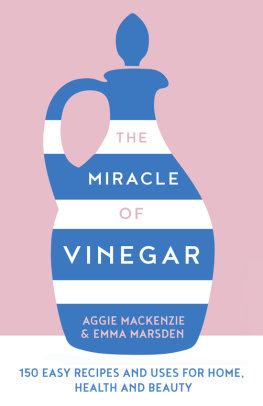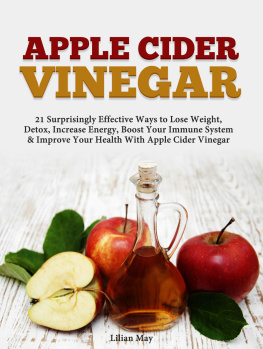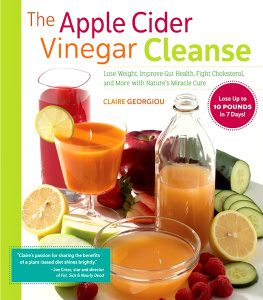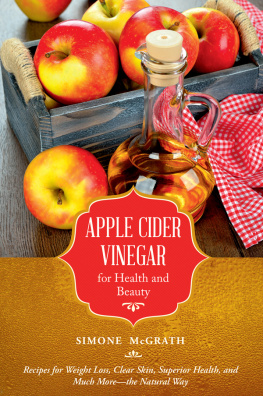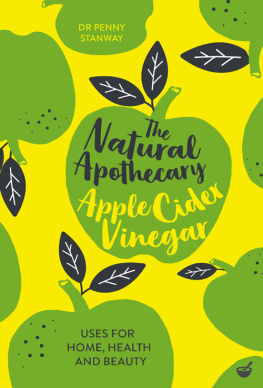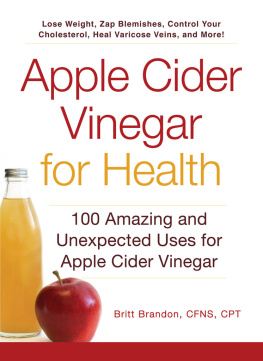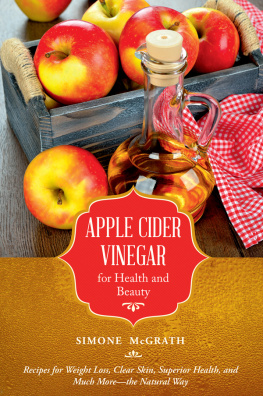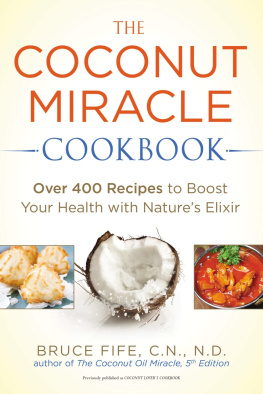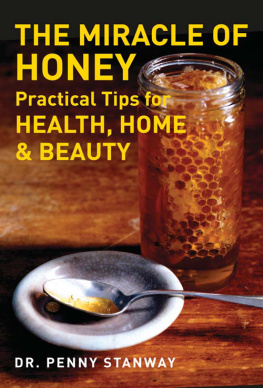Emma Marsden - The Miracle of Vinegar: 150 easy recipes and uses for home, health and beauty
Here you can read online Emma Marsden - The Miracle of Vinegar: 150 easy recipes and uses for home, health and beauty full text of the book (entire story) in english for free. Download pdf and epub, get meaning, cover and reviews about this ebook. year: 2019, publisher: HQ, genre: Home and family. Description of the work, (preface) as well as reviews are available. Best literature library LitArk.com created for fans of good reading and offers a wide selection of genres:
Romance novel
Science fiction
Adventure
Detective
Science
History
Home and family
Prose
Art
Politics
Computer
Non-fiction
Religion
Business
Children
Humor
Choose a favorite category and find really read worthwhile books. Enjoy immersion in the world of imagination, feel the emotions of the characters or learn something new for yourself, make an fascinating discovery.
- Book:The Miracle of Vinegar: 150 easy recipes and uses for home, health and beauty
- Author:
- Publisher:HQ
- Genre:
- Year:2019
- Rating:4 / 5
- Favourites:Add to favourites
- Your mark:
- 80
- 1
- 2
- 3
- 4
- 5
The Miracle of Vinegar: 150 easy recipes and uses for home, health and beauty: summary, description and annotation
We offer to read an annotation, description, summary or preface (depends on what the author of the book "The Miracle of Vinegar: 150 easy recipes and uses for home, health and beauty" wrote himself). If you haven't found the necessary information about the book — write in the comments, we will try to find it.
Emma Marsden: author's other books
Who wrote The Miracle of Vinegar: 150 easy recipes and uses for home, health and beauty? Find out the surname, the name of the author of the book and a list of all author's works by series.
The Miracle of Vinegar: 150 easy recipes and uses for home, health and beauty — read online for free the complete book (whole text) full work
Below is the text of the book, divided by pages. System saving the place of the last page read, allows you to conveniently read the book "The Miracle of Vinegar: 150 easy recipes and uses for home, health and beauty" online for free, without having to search again every time where you left off. Put a bookmark, and you can go to the page where you finished reading at any time.
Font size:
Interval:
Bookmark:
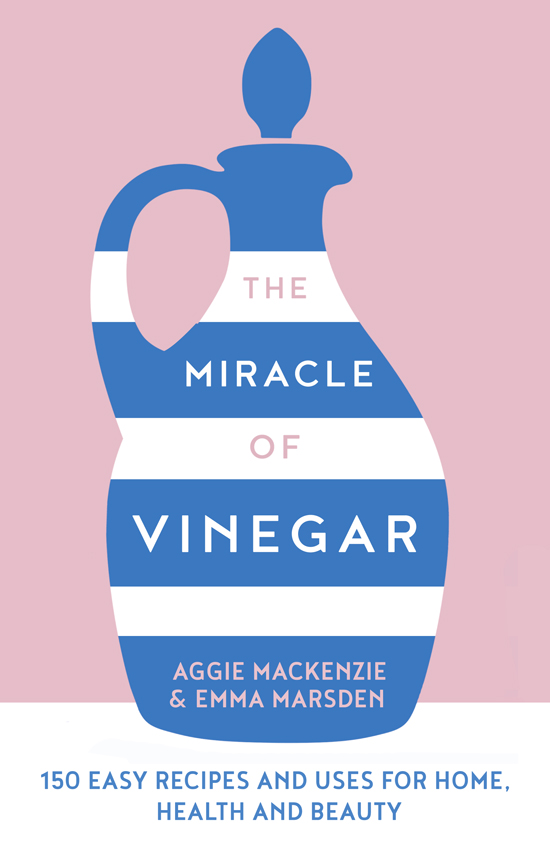

An imprint of HarperCollins Publishers Ltd
1 London Bridge Street
London SE1 9GF
First published in Great Britain by HQ in 2019
Copyright Aggie MacKenzie and Emma Marsden 2019
Aggie MacKenzie and Emma Marsden asserts the moral right to be identified as the author of this work.
A catalogue record for this book is available from the British Library.
This novel is entirely a work of fiction. The names, characters and incidents portrayed in it are the work of the authors imagination. Any resemblance to actual persons, living or dead, events or localities is entirely coincidental.
All rights reserved under International and Pan-American Copyright Conventions. By payment of the required fees, you have been granted the non-exclusive, non-transferable right to access and read the text of this e-book on-screen. No part of this text may be reproduced, transmitted, downloaded, decompiled, reverse engineered, or stored in or introduced into any information storage and retrieval system, in any form or by any means, whether electronic or mechanical, now known or hereinafter invented, without the express written permission of HarperCollins.
Ebook Edition December 2018 ISBN: 9780008310585
To my gorgeous sons Rory and Ewan for their enduring patience, boundless creativity and sharing their brilliant recipe ideas with me.
Aggie
Thanks to my mum for my culinary drive, to Kev for always tasting everything Ive made (no matter what time of day) and to the rest of my family for their support.
Emma
CONTENTS

Vinegar first came into my working life while I was at Good Housekeeping magazine in the early 1990s. I was director of the Institute and in this role I oversaw both the consumer testing and cookery departments. Each year, the January issue of the magazine carried a Stains Special and vinegar always featured prominently.
When, in 2002, I was asked to do a screen test for a new television programme about cleaning, I drew on my GH experience and rattled off a list of all the kooky remedies I had picked up over the years, and again vinegar enjoyed multiple name-checks.
I passed the screen test, got the TV gig and co-presented How Clean is Your House? on Channel 4 from 2003 to 2009. My co-presenter and I generally used old-fashioned, inexpensive and homespun remedies for clean-ups and very soon vinegar became the star of the show.
I am currently, about once a month, the Midnight Expert guest on the BBC Radio 5 Live Phil Williams show. People call in and text between midnight and 1am with their cleaning quandaries its strange but true, there is never any shortage of queries, even at that late hour. So often have I named vinegar as the solution to removing a stain that Phil, a good while back, instigated Aggies Vinegar Bingo, in which a big shout-out goes to the caller who, during the on-air hour, nails the nearest time to the V-word first getting a mention. Who knew vinegar could create so much buzz?
Vinegar is said to have been discovered by accident around 10,000 years ago, and it can be made from almost any fermentable item such as wine, apples, pears, grapes, berries, beer and potatoes.
For over 2000 years, vinegar has been used to flavour and preserve foods, heal wounds and fight infections as well as clean surfaces. There is some evidence that vinegar added to ones diet will reduce the glucose response to a carbohydrate load both in healthy adults and in sufferers of diabetes. It has also been suggested that drinking a little vinegar each day is useful as a dietary aid because it imparts a feeling of fullness. Since I began working on this book I have been drinking two tablespoons of organic cider vinegar with a tiny squeeze of honey every morning. Who knows whether its doing me any good, but I am sure it wont be doing me much harm either.
Both my sons are chefs in leading London restaurants and often use specialist vinegars for finishing dishes. Through them I have learned what a difference it can make and how to use it judiciously in my cooking.
It seemed natural that I should put my head together with that of my friend and former cookery editor colleague at Good Housekeeping, Emma Marsden, to come up with a book that combines my cleaning-with-vinegar expertise and her extensive culinary knowledge. Here is our we hope useful collection of tips, plus recipes that are, without exception, exciting, innovative and, importantly, straightforward. We hope youll enjoy them, together with beauty remedies and health hints all using this humble yet important liquid in its many and various forms.
Aggie MacKenzie

T he word vinegar comes from the French vin aigre, translated as sour wine, which accurately describes it. If youve ever left the dregs of an open bottle of wine for a few days and then attempted to drink the contents, only to be met with a sour taste, youve already started on the journey of vinegar-making. There are records of this magic ingredient being made as early as 5,000 BC in Babylon, and its thought that it was the result of a slipup while fermenting some wine. People cooking at that time experimented with this liquor, discovering that it could be used as both a condiment and ingredient.
Today it is a popular ingredient, produced commercially by either fast or slow fermentation. In fast fermentation, the liquid is oxygenated and the bacteria culture added. Slow fermentation is generally used for the production of specialised vinegars used in cooking; the culture of acetic acid bacteria grows on the surface of the liquid and fermentation evolves gradually over weeks or months and allows for the formation of a harmless slime made up of yeast and acetic acid bacteria, also known as the vinegar mother.
As history has already told, you can by all means leave a bottle of wine open covered with a cloth that lets in air but not fruit flies and eventually it will turn into vinegar. It may take months, though, so if you want to speed up the process and guarantee a result, here are a few pointers.
Firstly, vinegar is like sourdough and yogurt, in that its good to have some kind of starter to begin with. With sourdough its a leaven to add to flour and water; with yogurt its a couple of tablespoons of yogurt to add to milk thats then heated. For vinegar, its some unpasteurised vinegar with the mother to start the process. These bottles are labelled clearly and you can buy them online and in supermarkets and delis.
Secondly, you need time. The mixture of wine and a vinegar mother wont turn into vinegar overnight. You need a dark cupboard and the patience to wait for the mixture to ferment and the bacteria from the vinegar mother to turn the alcohol into acetic acid.
Thirdly, you need oxygen from the air, so use a wide-mouthed jar or ceramic pot and cover it with muslin or cheesecloth so the oxygen can get in but bugs cant.
Whether youre making wine or beer vinegar (see ), the basic recipe is much the same. Pour 400ml red wine or beer into a large open-mouthed jar (either ceramic or glass) then pour 200ml unpasteurised cider vinegar with the mother into the jar, too. Cover with a muslin or cheesecloth square and secure with a band. Label and store in a cool dark place for at least one month. It may take longer depending on conditions, but just keep tasting as you go. Some vinegar will naturally evaporate so, depending on how long it takes for the vinegar to brew, youll get around 400ml to use. You may find that a jelly-like substance forms in the liquid dont bin this, lift it out and transfer to another sterilised jar and use it to make another batch of vinegar with some of the unpasteurised liquor youve just fermented.
Font size:
Interval:
Bookmark:
Similar books «The Miracle of Vinegar: 150 easy recipes and uses for home, health and beauty»
Look at similar books to The Miracle of Vinegar: 150 easy recipes and uses for home, health and beauty. We have selected literature similar in name and meaning in the hope of providing readers with more options to find new, interesting, not yet read works.
Discussion, reviews of the book The Miracle of Vinegar: 150 easy recipes and uses for home, health and beauty and just readers' own opinions. Leave your comments, write what you think about the work, its meaning or the main characters. Specify what exactly you liked and what you didn't like, and why you think so.

